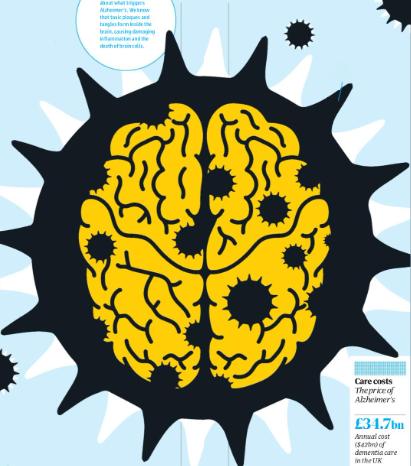
As Davangere Devanand, a neurologist at Columbia University Medical Center, combed through the reams of scientific data on Alzheimer's, he stumbled across a surprising idea - could an infection be involved in driving the disease?
"I was looking for an Alzheimer's treatment approach that had a reasonable shot of working," he says. "I found this old theory, going back 35 years, which linked herpes viruses to the disease, and there were all these indirect lines of evidence."
The further Devanand looked, the more he found. Since the mid-80s, a handful of scientists around the world had doggedly pursued the idea that either a virus or a bacterium could play a role in Alzheimer's, despite almost complete antipathy from those studying more accepted theories about the disease. Colleagues snubbed them, leading scientific journals and conferences rejected their work and funding had been threadbare, but slowly and surely, they built an increasingly compelling case.
In particular, evidence pointed towards herpes simplex virus 1 (HSV-1) - a pathogen found in 70% of the UK population, and the cause of oral herpes as a prominent suspect. Studies in the UK, France and Scandinavia suggested that people who had been infected with herpes were more likely to get Alzheimer's. When Prof Ruth Itzhaki from Oxford University's Institute of Population Ageing - who has done more than any other scientist to advance the HSV-1 theory of Alzheimer's - examined postmortem brain samples from patients, she found greater amounts of the virus's DNA than in people who had not died of the disease.
"Then there was this 2018 study from Taiwan, which was quite dramatic," says Devanand. "When people with herpes were treated with a standard antiviral drug, it decreased their risk of dementia nine-fold."
Esta historia es de la edición February 24, 2023 de The Guardian Weekly.
Comience su prueba gratuita de Magzter GOLD de 7 días para acceder a miles de historias premium seleccionadas y a más de 9,000 revistas y periódicos.
Ya eres suscriptor ? Conectar
Esta historia es de la edición February 24, 2023 de The Guardian Weekly.
Comience su prueba gratuita de Magzter GOLD de 7 días para acceder a miles de historias premium seleccionadas y a más de 9,000 revistas y periódicos.
Ya eres suscriptor? Conectar

We're making a music video-but I can't play, or even act
I am in a lifeboat station on the south coast, standing beneath the stern of a rescue vessel, wearing a borrowed fisherman's jumper and holding a banjo. There are lights on me, and I am very much at sea.

BOOKS OF THE MONTH
The best translated fiction

Village people A chilly tone of doom infects these unsettling folk tales, following a settlement from the deep past to near future
The quintessential \"bad place\" is one of the staples of horror fiction. For Stephen King, the bad place - think the Overlook Hotel in The Shining - usually acts as a repository for a long-forgotten evil or injustice to resurface.

A labour of love Haruki Murakami revisits a hypnotic city of dreams and a tale of teen sweethearts, in material he's worked on over four decades
The elegiac quality of Haruki Murakami's new novel, his first in six years, was perhaps inevitable considering its origins. The City and Its Uncertain Walls began as an attempt to rework a 1980 story of the same title, originally published in the Japanese magazine Bungakukai, which Murakami, unsatisfied, never allowed to be republished or translated.

Leading questions The former German chancellor slights her enemies by barely mentioning them-and is frustratingly opaque on her own big calls
Towards the end of her 16-year tenure, former German chancellor Angela Merkel was garlanded with superlative titles: the \"queen of Europe\", the \"most powerful woman in the world\".

Double vision
Is the pay really that good? Do you get bored? We ask 'David Brent', 'Nessa' and 'Ali G' what it's like to make money as the lookalike of a comic creation

Robopop Teen star who does not exist
Miku is a 'Vocaloid' -a holographic avatar that represents a digital bank of vocal samples-performing sellout tours for thousands of very real mega-fans

The show must go wrong
How did a farce about a gaffe-filled amateur dramatic whodunnit become one of Britain's greatest ever exports, the toast of dozens of countries?

Europe's latest radical populist typifies a swing on the continent
Politics in Romania can be a bloody business, especially on the right. The excesses of the Iron Guard, an insurrectionary, violently antisemitic, ultranationalist 1930s political-religious militia, stood out even at a time when fascist parties were wreaking havoc in Germany, Italy and Spain. Given what is happening in Europe today, the events of that period are instructive.

It's high time to tax cannabis and fix French finances
France might not be broke, but the state of its public finances is, well, definitely not good. Total debt stands at €3.2tn ($3.4tn) - 112% of GDP. Interest payments on that debt are the second largest public expenditure after education (which includes everything from crêche, or preschool, to universities) and are higher than the amount spent on defence. And this year's budget deficit is projected to be 6%, three points above the EU's 3% limit.